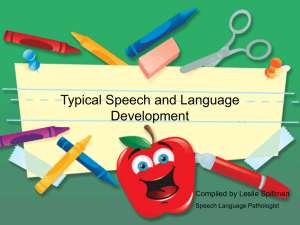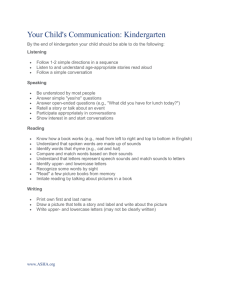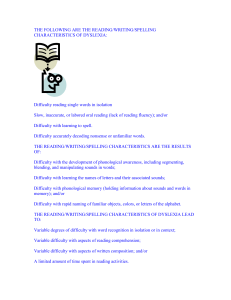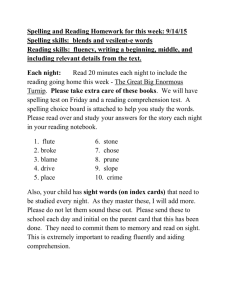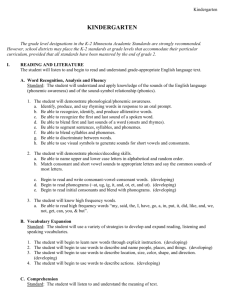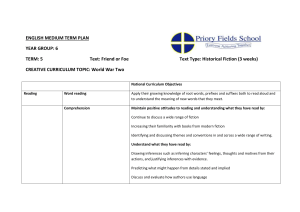Speech and Language Development during Elementary School
advertisement
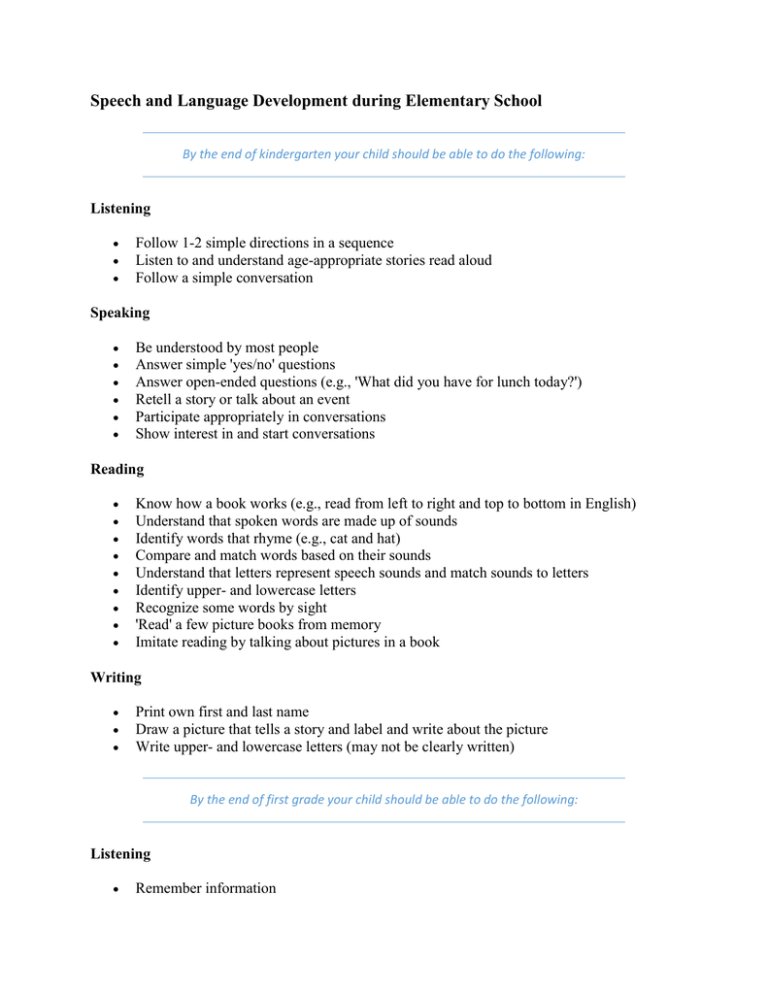
Speech and Language Development during Elementary School By the end of kindergarten your child should be able to do the following: Listening Follow 1-2 simple directions in a sequence Listen to and understand age-appropriate stories read aloud Follow a simple conversation Speaking Be understood by most people Answer simple 'yes/no' questions Answer open-ended questions (e.g., 'What did you have for lunch today?') Retell a story or talk about an event Participate appropriately in conversations Show interest in and start conversations Reading Know how a book works (e.g., read from left to right and top to bottom in English) Understand that spoken words are made up of sounds Identify words that rhyme (e.g., cat and hat) Compare and match words based on their sounds Understand that letters represent speech sounds and match sounds to letters Identify upper- and lowercase letters Recognize some words by sight 'Read' a few picture books from memory Imitate reading by talking about pictures in a book Writing Print own first and last name Draw a picture that tells a story and label and write about the picture Write upper- and lowercase letters (may not be clearly written) By the end of first grade your child should be able to do the following: Listening Remember information Respond to instructions Follow 2-3 step directions in a sequence Speaking Be easily understood Answer more complex 'yes/no' questions Tell and retell stories and events in a logical order Express ideas with a variety of complete sentences Use most parts of speech (grammar) correctly Ask and respond to 'wh' questions (who, what, where, when, why) Stay on topic and take turns in conversation Give directions Start conversations Reading Create rhyming words Identify all sounds in short words Blend separate sounds to form words Match spoken words with print Know how a book works (e.g., read from left to right and top to bottom in English) Identify letters, words, and sentences Sound out words when reading Have a sight vocabulary of 100 common words Read grade-level material fluently Understand what is read Writing Express ideas through writing Print clearly Spell frequently used words correctly Begin each sentence with capital letters and use ending punctuation Write a variety of stories, journal entries, or letters/notes By the end of second grade your child should be able to do the following: Listening Follow 3-4 oral directions in a sequence Understand direction words (e.g., location, space, and time words) Correctly answer questions about a grade-level story Speaking Be easily understood Answer more complex 'yes/no' questions Ask and answer 'wh' questions (e.g., who, what, where, when, why) Use increasingly complex sentence structures Clarify and explain words and ideas Give directions with 3-4 steps Use oral language to inform, to persuade, and to entertain Stay on topic, take turns, and use appropriate eye contact during conversation Open and close conversation appropriately Reading Have fully mastered phonics/sound awareness Associate speech sounds, syllables, words, and phrases with their written forms Recognize many words by sight Use meaning clues when reading (e.g., pictures, titles/headings, information in the story) Reread and self-correct when necessary Locate information to answer questions Explain key elements of a story (e.g., main idea, main characters, plot) Use own experience to predict and justify what will happen in grade-level stories Read, paraphrase/retell a story in a sequence Read grade-level stories, poetry, or dramatic text silently and aloud with fluency Read spontaneously Identify and use spelling patterns in words when reading Writing Write legibly Use a variety of sentence types in writing essays, poetry, or short stories (fiction and nonfiction) Use basic punctuation and capitalization appropriately Organize writing to include beginning, middle, and end Spell frequently used words correctly Progress from inventive spelling (e.g., spelling by sound) to more accurate spelling By the end of third grade your child should be able to do the following: Listening Listen attentively in group situations Understand grade-level material Speaking Speak clearly with an appropriate voice Ask and respond to questions Participate in conversations and group discussions Use subject-related vocabulary Stay on topic, use appropriate eye contact, and take turns in conversation Summarize a story accurately Explain what has been learned Reading Demonstrate full mastery of basic phonics Use word analysis skills when reading Use clues from language content and structure to help understand what is read Predict and justify what will happen next in stories and compare and contrast stories Ask and answer questions regarding reading material Use acquired information to learn about new topics Read grade-level books fluently (fiction and nonfiction) Reread and correct errors when necessary Writing Plan, organize, revise, and edit Include details in writing Write stories, letters, simple explanations, and brief reports Spell simple words correctly, correct most spelling independently, and use a dictionary to correct spelling Write clearly in cursive By the end of fourth grade your child should be able to do the following: Listening Listen to and understand information presented by others Form opinions based on evidence Listen for specific purposes Speaking Use words appropriately in conversation Use language effectively for a variety of purposes Understand some figurative language (e.g., 'the forest stretched across') Participate in group discussions Give accurate directions to others Summarize and restate ideas Organize information for clarity Use subject area information and vocabulary (e.g., social studies) for learning Make effective oral presentations Reading Read for specific purposes Read grade-level books fluently Use previously learned information to understand new material Follow written directions Take brief notes Link information learned to different subjects Learn meanings of new words through knowledge of word origins, synonyms, and multiple meanings Use reference materials (e.g., dictionary) Explain the author's purpose and writing style Read and understand a variety of types of literature, including fiction, nonfiction, historical fiction, and poetry Compare and contrast in content areas Make inferences from texts Paraphrase content, including the main idea and details Writing Write effective stories and explanations, including several paragraphs about the same topic Develop a plan for writing, including a beginning, middle, and end Organize writing to convey a central idea Edit final copies for grammar, punctuation, and spelling By the end of fifth grade your child should be able to do the following: Listening Listen and draw conclusions in subject area learning activities Speaking Make planned oral presentations appropriate to the audience Maintain eye contact and use gestures, facial expressions, and appropriate voice during group presentations Participate in class discussions across subject areas Summarize main points Report about information gathered in group activities Reading Read grade-level books fluently Learn meanings of unfamiliar words through knowledge of root words, prefixes, and suffixes Prioritize information according to the purpose of reading Read a variety of literary forms Describe development of character and plot Describe characteristics of poetry Analyze author 's language and style Use reference materials to support opinions Writing Write for a variety of purposes Use vocabulary effectively Vary sentence structure Revise writing for clarity Edit final copies Suggestions for Parents and Caregivers ...in early elementary grades (K-2): Talk with your child frequently Read a variety of books; read often and talk with your child about the story Help your child focus on sound patterns of words such as those found in rhyming games Have your child retell stories and talk about events of the day Talk with your child during daily activities; give directions for your child to follow (e.g., making cookies) Talk about how things are alike and different Give your child reasons and opportunities to write ...in later elementary grades (3-5): Continue to encourage reading; find reading material that is of interest to your child Encourage your child to form opinions about what he or she hears or reads and relate what is read to experiences Help your child make connections between what is read and heard at school, at home, and in other daily activities Talk aloud as you help your child understand and solve problems encountered in reading material Help your child recognize spelling patterns, such as beginnings and endings of words (e.g., pre- or -ment) Encourage your child to write letters, keep a diary, or write stories
